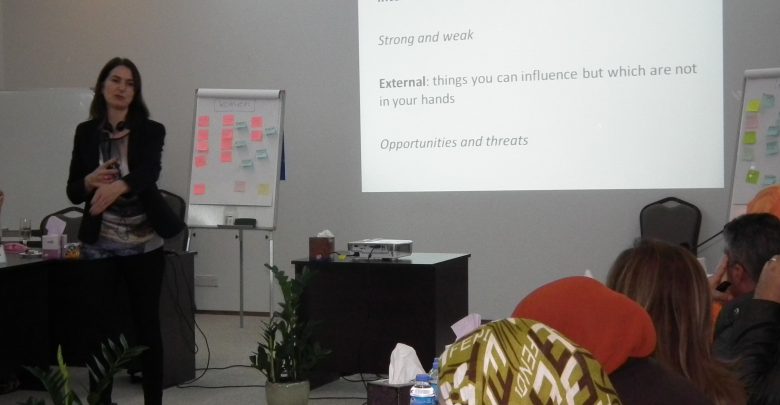Blog Day 2-Valuable women in Iraq

Blog Day 2 – 13 January 2014
Valuable women in Iraq
By Anne Graumans
Sweets are being shared at the start of the second training day in Erbil, Iraq. It is the birthday of Mohammed, yesterday notable already by the fireworks. Tonight, the square in front of the ancient Citadel will be colourfully lightened. The group of trainers who will train 1000 women in all 18 provinces in the run-up to the parliamentary elections at the end of April, is now complete. The two trainers from Anbar in West Iraq went through some difficulties to get here in time. The recent attacks and turmoil have destroyed bridges and increased the ques for the checkpoints.
The basic campaign training of the Foundation Max van der Stoel (FMS) is the starting point of the training. For 15 years already, FMS conducts training to politicians and political parties in emerging democracies. Trainers never come as consultant or as teacher, but focus on tools to increase one’s capacities as a politician, to prepare for one’s campaign and to make sure that the politician’s message is heard as well as possible by as many people as possible. FMS conducts training in Eastern Europe, the Caucasus, North Africa and the Middle East.
Iraq has a quota: 25% of the seats and functions in Parliament are reserved for women. Like everywhere in the world, also here in Iraq there is a debate about the quota. “Are we sufficiently focusing on quality?”, “Do we get the best Members of Parliament?” These are questions which we raise in the training. The position of women in Iraq seems to justify the quota. The society predominantly serves men and this starts at birth already. A midwife gets a higher fee when the newly born is a boy and young girls are punished if they have an unknown number in their telephone. Women in Parliament cannot always count on support from their husbands either. Examples are shared, which show that husbands consider it more important to get a decent meal than that their wives are in time for a meeting, or prohibit their wives to hire a domestic help. “We have all inherited the traditional values of the past decades”, one of the participants claims, “and it is up to us to continue working on equality between men and women”. Laws can help to do so. For me as a trainer it is particularly challenging to challenge the trainers to keep the role of existing values modest when they train the 1000 women. After all, this is all about empowerment of women who have enrolled themselves for elections and who want to become a better politician by training and exchange of experiences.

